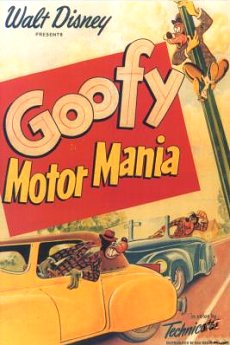| Motor Mania | |
|---|---|
 Poster | |
| Directed by | Jack Kinney |
| Story by | Dick Kinney Milt Schaffer |
| Produced by | Walt Disney |
| Starring | Bob Jackman John McLeish |
| Music by | Paul J. Smith |
| Animation by | John Sibley Charles Nichols Ed Aardal Jack Boyd |
| Layouts by | Al Zinnen |
| Backgrounds by | Claude Coats |
| Color process | Technicolor |
Production company | |
| Distributed by | RKO Radio Pictures |
Release date |
|
Running time | 7 minutes (one reel) |
| Country | United States |
| Language | English |
Motor Mania is a cartoon released by Walt Disney Productions on June 30, 1950. [1] In this short, Goofy is a Mr. Hyde-type split personality, who gets behind the wheel and shows the dangers of not driving safely. [2]